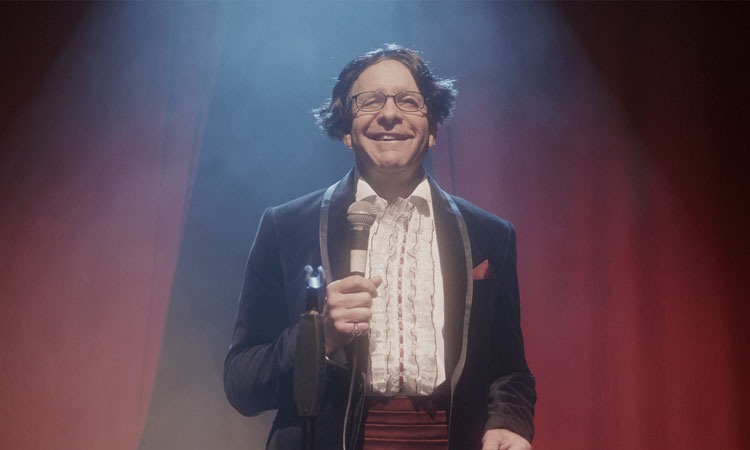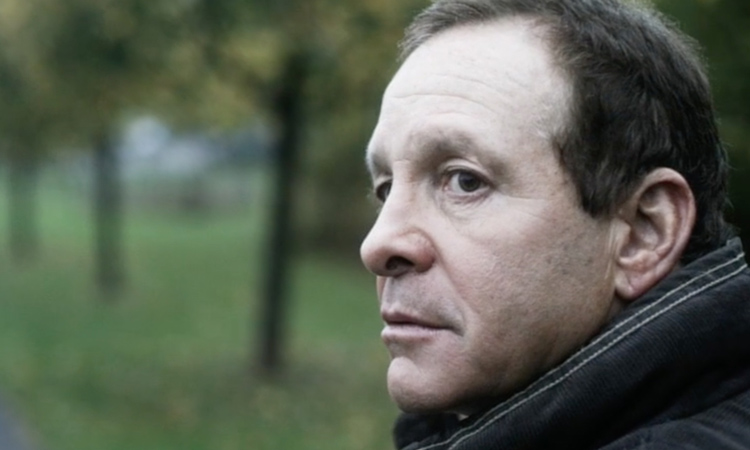Telling the tale of a heckle gone bad, er… Heckle follows comedian Joe Johnson as he and his friends decide to throw an Eighties Halloween party, complete with VHS and no mobile phones. However, when their joke of being part of their own Eighties slasher becomes a little too real, Joe has to find out who’s targeting them.
Directed by Martyn Pick and written by Airell Anthony Hayles, Heckle stars Guy Combes as Joe and Steve Guttenberg as foul-mouthed Nineties comedian Ray Kelly, alongside Dani Dyer and Toyah Wilcox.
We sat down with Guttenberg to speak about fame, comedians and what it’s like playing the bad guy…
How did you get involved with Heckle?
I got a call from [Airell] Anthony Hayles and the guys and they proposed this film and I thought it would be really interesting. That’s why I wanted to do it. I thought the character was so outlandish and such a dark guy that I thought it would be really interesting to act. That’s what I’m always looking for, something that’s interesting that’s watchable… so hopefully then the audience wants to watch it!
What do you look for when choosing a role?
First, it’s the script, second, it’s the location and third it’s the money. Haha!
I look for something that’s gonna make you say ‘oh I want to do this!’. Doing it is a lot of work – you put your time and effort into something and you want it to be seen and you want it to land. Acting is a very strange profession. There are all kinds of acting. There’s acting on the stage, there’s acting on film and then there are all kinds of other acting, which is reality shows and things like that. What’s happened to the cinema is that a lot of it has become unimportant, you know, just sort of content-filling stations. So you have to adjust to that as an actor.
Sometimes you’re going to do something that is a really interesting part, but nobody’s going to see it, which might happen to Heckle. Or you do some television show that millions of people are going to see, but is kind of meaningless. It won’t ever be remembered and nobody in ten years is going to say: “Oh, you know, let’s have a whole evening of, I don’t know, Gilligan’s Island from 40 years ago” (I don’t want to say the name of a show now!). Nobody’s going to say that. But they might say, for me: “Hey let’s watch Three Men And A Baby” ten years from now or: “Let’s watch Police Academy or The Bedroom Window” (which I thought was a really good movie).
So I look for different things and I want to work. I enjoy working, it’s exciting to me. I think it’s different now. You also have a personal life, if you’re lucky, that is quite separate from your career. I really try to remember that. I think it was a talk show host who said that the other day and I thought it was really right. James Corden – who’s not just a talk show host, of course, he’s a brilliant actor and singer and musician – but he did say that in an interview, and that landed on me.
It’s really important to remember that you are not your career. You are separate. You start defining your success as a person through your success as an actor. Does Steven Spielberg want to hire me? Yes? Oh, I’m great. No? Oh, I’m terrible. Did the movie make money? Yes? Oh I’m a big success. No? I’m a failure. That’s really what I think many actors wrestle with.
I saw this interview or something with an actor who I’ve worked with and he said ‘I work really hard at being famous because that’s what it’s about today’. Do you have a lot of Twitter followers or Instagram followers? A lot of people work really hard at being famous and that feeds their family. There are great actors who are not famous but are brilliant. They’re everywhere, everywhere in the world. They’re not famous but they’re great.
The industry is starting to look very different with so many ways people can access movies…
There [used to be] fewer choices. You had maybe five television channels and you had very few theaters, so you would have maybe two new movies coming out a week? Or maybe one, and you’d go see that movie. But now there are 20 movies coming out and there are a thousand movies trying to get released. It’s all about a certain amount of success and do you have a hit movie or do you have a hit television show? But you know, I’m not complaining because the business has been better than terrific to me and my family, and my friends! I think Hunter S Thompson said a great quote, he said: “Show business is a dark long plastic hallway where pimps and thieves go free and good men die like dogs… and there’s also a negative part!”
Your character, Ray Kelly, is horrible! How did you get to grips with that role?
What I found about Ray Kelly was that, first of all, he’s the name of a former police chief of New York City and I know him – obviously, he’s the exact opposite of this Ray Kelly, but it sort of gave me something personal to connect with.
He doesn’t think he’s a dark character. He thinks he’s actually pretty righteous in what he feels and what he’s doing. He loves himself and he thinks everybody else is wrong and everybody else is annoying and everybody else wants something from him. So he’s actually the good guy in his mind in this movie. He’s a giver. He’s generous and he’s kind, and he thinks that’s how he is.
So I watched a bunch of comics that I have admired and been fascinated by. Especially guys from New York; the more ‘angry guys’. I found that they still want to be funny, but there’s a bitterness that comes out, that maybe started when they were young, but they can’t help it. It bubbles to the surface.
So I tried to play that and play against being angry, but he couldn’t help but be angry. I thought the wig was, to me, him covering up who he really is, and he actually thinks that wig looks great. Which it doesn’t [haha] but it’s sort of his trademark. Sort of an old style, Vegas comedian, you know – wears a velvet tuxedo and he tries to hearken back to a different time.
I actually really enjoyed it because I got to improvise a lot. Martin Pick, our director, gave me a lot of room to play and that was fun. I was on a real stage in a real theater and it was terrific. I love working in the UK. There is some sort of freedom that comes over as an American actor. Probably what comes over to an English actor or a global actor who comes to the United States. There’s a freedom, you know, you’re not home, you can really be someone else. There’s something great about being overseas.

Did you look at any particular comedians for inspiration?
Yeah, I looked at Andrew Dice Clay, he was really interesting. I looked at some of the older guys, Don Rickles and Shecky Greene and Norm Crosby.
There were some unknown fellows that I would just watch their YouTubes of them ranting and raving in these small clubs too. There’s also a guy named John Mulaney, he’s not a dark guy, but I really really love his comedy. I also looked at a lot of Woody Allen’s stuff, which is not dark but really funny and I watched a lot of Lenny Bruce. His stuff was really good, really interesting and funny.
What would you say audiences will get from Heckle?
Ah well… if you like suspense and blood together (which is actually a pretty good combination) you’ll enjoy the film! I’m saying that with half a joke because there is blood, but it’s also a psychological story and I think that will keep you attuned to it as well. I just think that filmmakers just did a grand job, I really do.
Heckle’s release date is TBC. Keep up to date with Evolutionary films.
